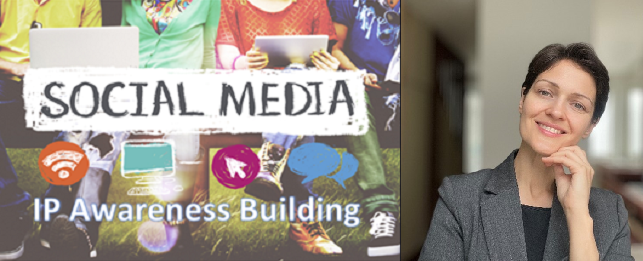Online Marketing for IP Experts – Interview with Maria Boicova-Wynants
To create awareness about the online marketing best practice for IP experts we are regularly interviewing IP experts, who are successfully using LinkedIn and other digital channels to position themselves and gain new clients via those channels. Additionally, we are showing their best practice in the online marketing Newsletter of the 🎯 IP Management Pulse and its Online Marketing Guides. Here you can find the last issues in the archive and also subscribe to never miss any of our online marketing resources. Summary of the key answers by Maria Boicova-Wynants:
- Online communication skills are becoming more important
- Authenticity is key on Social Media
- Create trust with meaningful customer journeys
- Organic engagement is the way to grow on LinkedIn
Background Question 1:
We are currently seeing a continuously accelerating digital transformation in the IP system. Especially in dealing with the stakeholders of the IP system as well as in the relationship and communication between attorneys and clients. As well as networking and professional exchange between IP experts, for example via social networks such as LinkedIn.
IP business academy: How do you perceive these changes?
Maria Boicova-Wynants: These changes are very real. The accelerating digital transformation, also within the IP system, is reshaping how all of the stakeholders interact and communicate. This includes also IP professionals and their clients. The shift to online platforms like LinkedIn for networking and professional exchange is evident, especially in the post-Covid era where remote work has (suddenly) become the norm. While this digital shift offers significant time efficiencies and opportunities previously unavailable, it obviously also comes with a distinct set of challenges. Online networking requires one to follow different rules compared to traditional offline networking. It demands tailored approaches and an understanding of the specific traits of virtual interaction. These traits include the need for concise and engaging communication, the importance of consistent online presence, and the ability to navigate virtual etiquette effectively.
Building a personal brand of an expert, or better a professional brand, particularly on LinkedIn, is essential but – again – requires careful strategy. IP professionals must balance promoting their services without appearing overly pushy or sales-focused. Just blatantly and ceaselessly self-promoting without delivering any value is just a no-go. Authenticity is key in selling oneself, as clients and peers are drawn to genuine interactions rather than this overt and pushy self-promotion.
As someone who has been on the platform since 2009, I observe that there are more and more people interacting and posting nowadays. However, the IP community at large with a few exceptions, remains largely silent. There are some posts about events attended (often without much reflections on the lessons learned, prompting a question – why am I reading this?), or posts on some interesting but very complex topics (great to show your professionalism amongst peers, but not to attract potential clients). The bottom line in my view, is, online is here to stay and online plays according to a distinct set of rules, and if IP professionals want to be on demand in the future, they must learn these rules very-very good.
Background Question 2:
Expert marketing refers to the targeted presentation and positioning of experts and their expertise. This includes a strong personal brand presence of the expert in the online area, in particular the creation and distribution of high-quality and useful content, and targeted lead generation. This also includes online reputation management, i.e. monitoring and positively influencing your own expert brand.
How important is your expert positioning for you and your business?
Very important.
Expert positioning is like your own unique flavor in a world full of ingredients. It’s about your voice, your style, and your way of doing things amidst the noise of the digital realm. Essentially, this is how you stand out. While it often starts as an organic journey of exploration (pretty chaotic at the outset in my case), gradually, you carve out your niche and develop your personal brand strategy, even if it’s mostly in your head rather than on paper. At least for me it is – I don’t have any plan written out, but I for sure do have it at the back of my head at all times. I know the message I want to bring and everything I do online adds to that same message.
Authenticity is the secret sauce here. I am convinced that your personal brand must be genuine, reflecting who you truly are and what you stand for. However, certainly, there are certain aspects that you can and should (perhaps especially) accentuate. It’s about highlighting your expertise in a way that resonates with your audience, whether it’s through insightful articles, engaging social media posts, or thought-provoking discussions.
About online reputation management — it’s like the quote I came about: “keeping an eye on the simmering pot to ensure it doesn’t boil over”. Everything you say and do online can influence how others perceive you, so you better think twice. In other words, this means being mindful of your interactions, responding gracefully to feedback, and proactively shaping your online presence to reflect your expertise and integrity. One step at a time.
In the end, expert positioning and online reputation management takes time, effort, and a dash of authenticity to get it just right. But with dedication and consistency, you can create a personal brand that leaves a lasting impression on your audience and sets you apart from the competition. While standing out (in a good way) does eventually translate in a growing business.
Background Question 3:
50% of all decision-makers in business today are millennials and therefore digital natives. These are people who are used to obtaining information digitally and shopping digitally. The search behavior for specialist information has changed fundamentally in recent years. 40% of the 3.5 billion searches per day on Google are shifting to social networks and so more and more content is presented there. More and more customer journeys in the legal sector are taking place completely online.
How important do you consider online marketing to be and how important is a consistent customer journey for potential clients from social media to the website to email?
Again – very important! Online marketing is absolutely essential, especially considering that, as you say a significant portion of decision-makers are digital natives and there will even be the next shade to it – with virtual natives soon coming to the money — they rely heavily on online sources for information and transactions. Moreover, with a substantial portion of searches shifting to social networks, the importance of maintaining a strong online presence cannot be overstated. People Google you – this is just a fact. While whatever Google knows about you is something you can influence.
When it comes to the customer journey, it’s about fostering meaningful connections and building trust every step of the way. While the traditional marketing funnel still applies, the approach for expert online marketing is nuanced. It’s about showcasing expertise while remaining approachable, delivering value generously, and ensuring even more value is provided once a client signs up for your services. There is no one size fits all here, but it is super important to do it consistently and to think it through very-very good.
For (IP) professionals, being easily accessible is also key. This means having open channels of communication such as direct messaging, clear email contact, and perhaps even a user-friendly sign-up form. The goal is to gently guide potential clients through the journey from prospect to actual client, focusing on establishing trust and connection along the way.
Easier said than done, of course… but… In my view, at the heart of it all is the understanding that people buy from people they know and trust. By ensuring potential clients have ample opportunities to get to know you, easily contact you, and regularly receive value from your expertise, you can effectively nurture relationships and drive conversions in the digital realm. It is essentially about understanding that building a strong professional brand is (!) your business. Yes, it’s not only about your actual IP services. You can be a great expert, but if no one knows you, how can you serve others with your expertise?
Background Question 4:
The search behavior for experts and the initiation of personal contacts has also changed due to social distancing during Corona pandemic and the current “new normal work“. The Google searchability of experts and their reputation is increasingly determined by their online presence. Spending on online marketing increased by 31 % last year. Designed for professional relationships, LinkedIn is growing by 15% annually with over 830 million members and is by far the most important network for legal advisors and IP experts.
Do you also observe these growth rates in client requests from your Online Marketing?
Yes, I do observe significant growth rates in client requests from my online marketing efforts. It’s evident that the shift towards digital platforms, especially during the pandemic, has greatly influenced how potential clients find and connect with experts. While it’s difficult to determine the exact impact of my personal marketing endeavors versus the overall growth of platforms (i.e. LinkedIn), I believe both factors contribute to the increased engagement.
I’ve chosen to focus primarily on organic engagement rather than paid advertising or sponsored posts. This approach aligns with my belief in authenticity and building relationships over time. But despite not actively soliciting engagement or using paid tactics, I still have seen a noticeable uptick in client requests, which, I guess, speaks to the effectiveness of an active online presence and having a professional brand. Overall, I believe that maintaining a strong online presence (especially on LinkedIn) will continue to be essential for attracting and retaining clients.
About the interviewee:
 Maria Boicova-Wynants is a partner with Starks, an IP and International trade law firm in Ghent, Belgium, and heads her own IP strategy consulting practice. She holds LL.B. from the University of Latvia, MBA from Vlerick Business School and LL.M. (MIPLM) from CEIPI. Maria is a Latvian Patent and Trademark Attorney, European Trademark and Design Attorney, as well as European Mediator in civil and commercial cross-border disputes for almost two decades. Her main areas of expertise are IP strategy, contracts, and alternative dispute resolution. She is also a mediator and art law expert on the list of the Court of Arbitration for Art (the Hague), and Mediator on the WIPO ADR Centre’s List of neutrals.
Maria Boicova-Wynants is a partner with Starks, an IP and International trade law firm in Ghent, Belgium, and heads her own IP strategy consulting practice. She holds LL.B. from the University of Latvia, MBA from Vlerick Business School and LL.M. (MIPLM) from CEIPI. Maria is a Latvian Patent and Trademark Attorney, European Trademark and Design Attorney, as well as European Mediator in civil and commercial cross-border disputes for almost two decades. Her main areas of expertise are IP strategy, contracts, and alternative dispute resolution. She is also a mediator and art law expert on the list of the Court of Arbitration for Art (the Hague), and Mediator on the WIPO ADR Centre’s List of neutrals.



